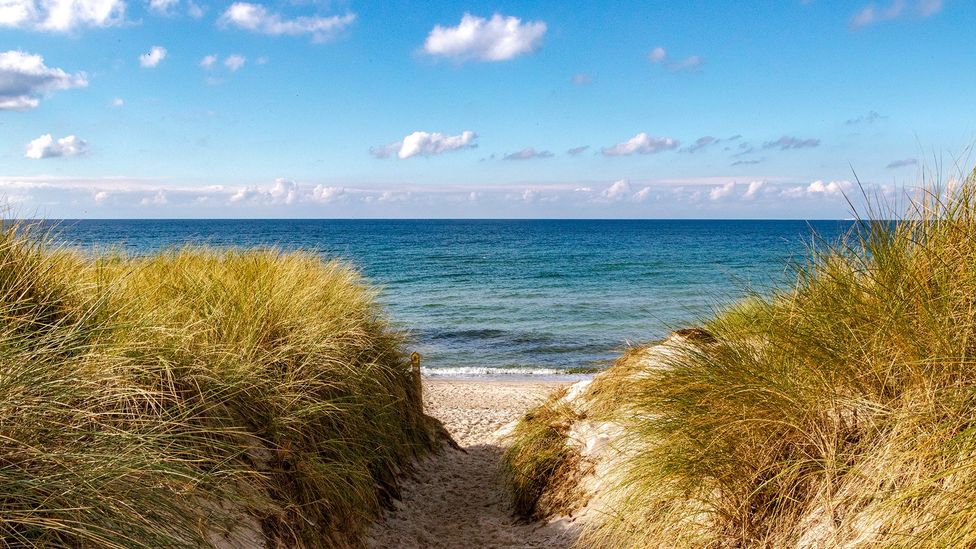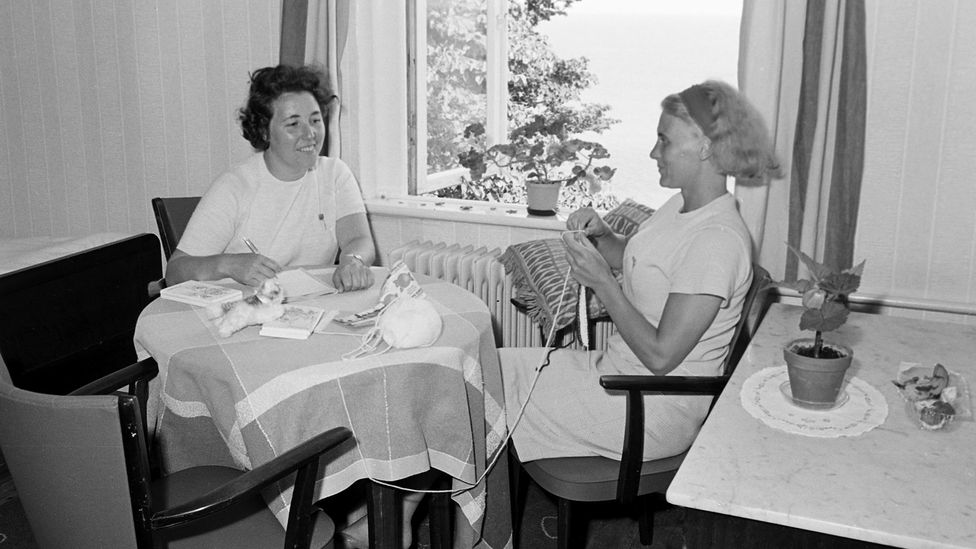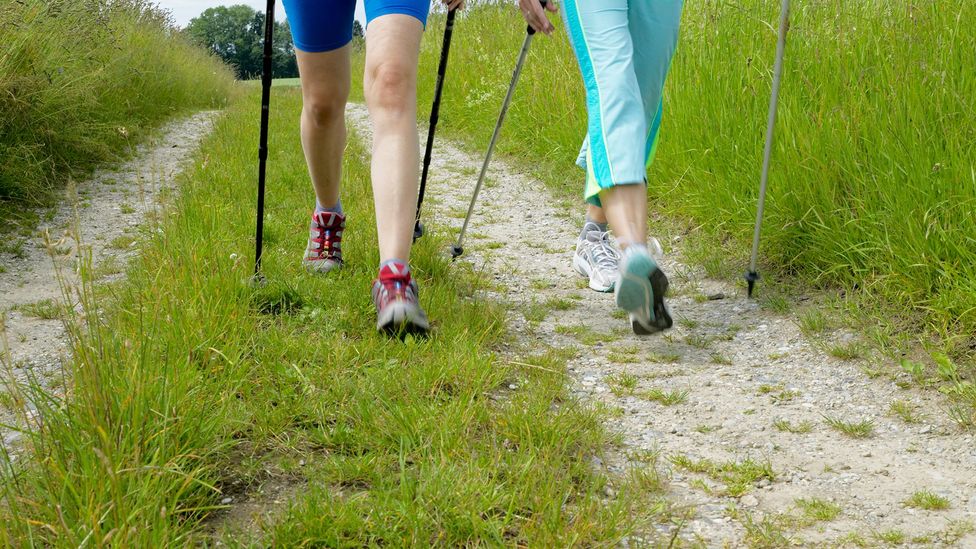Sebastian Schwerk lay awake at night, his mind racing. His father had recently died of leukaemia. Schwerk had been caring for him for months, together with his siblings, as well as looking after his own family. Now his mother needed care, too. His two older children were going through puberty. And he worried that with so much going on, his youngest son wasn't getting enough attention.
"All of those issues were causing me huge stress," recalls Schwerk, who is the creative director of a communications agency in Dresden, Germany. "And then my partner said to me: 'You do realise you have a right to a health retreat, don't you?'"
Germany is possibly the only country in the world where struggling parents are legally entitled to a "Kur", a health retreat of about three weeks, every four years. A Kur is prescribed by a doctor, and mostly funded by insurance. Meals, childcare and therapies are all included. Crucially, the retreat can be done not just to treat a health problem but also as a preventative measure to stop relatively mild problems from ballooning into worse ones.
Schwerk, for example, decided to apply for an insurance-funded retreat as a preventative measure, and to treat his insomnia. "My main need was really to spend as much time as possible with my son, without stress, and to get back into a healthier lifestyle," he says. In January 2020, he and his youngest son spent three weeks at a seaside clinic. Schwerk took courses in muscle relaxation therapy, meditation, Nordic walking and yoga, none of which he had tried before. He even gave up some treasured habits: "Alcohol is completely banned in those clinics, which can be difficult for Germans. So I said to myself, 'Well, I do like my after-work beer, but it's actually a great idea to skip that for three weeks.'"
It may sound like a holiday, but research shows that the retreats are surprisingly effective in preventing far worse health problems. Some also argue, however, that growing demand for them should ring alarm bells, as a signal that more and more parents are cracking under the strain of everyday life. The lingering impact of the Covid-19 pandemic and lockdowns appears to have worsened that pressure.

Health retreats for parents can have lasting benefits, research has shown (Credit: Getty Images)
"The clinics are reporting that the mothers and fathers who come to them are sicker than before [the pandemic]," says Yvonne Bovermann, director of Deutsches Müttergenesungswerk, a non-profit organisation that runs some 70 clinics offering retreats all over Germany. Most of the patients are mothers. "The vast majority of our retreats are meant to be preventative. But the clinics say that a large proportion of the women, about 30%, already arrive in a much worse state, where you would offer treatment, not prevention."
The most common problems are psychological problems such as anxiety, insomnia, or depressive symptoms, which now affect over 90% of the parents who come to their retreats, Bovermann says – up from previously 80%. "In addition, almost all of them have physical problems, such as knee pain or back pain. But the reason they go on a retreat isn't the knee pain, it's that they just don't know how to get through the day anymore. They're so ground down, they need those three weeks away from it all, to allow them to start thinking about: 'How do I get out of this situation?'"
The origin of the retreats may feel like a far cry from the worries of modern parenting. After World War Two, Elly Heuss-Knapp, a politician and wife of Germany's president, founded the Müttergenesungswerk to support exhausted mothers. Those early attendees included mothers suffering from the effects of war and malnourishment, while caring for traumatised children and husbands.
Today, a different kind of familial stress is gaining increasing attention in Germany and around the world: parental burnout.
Global research has highlighted the profound impact of parental burnout – defined as a state of "overwhelming exhaustion related to one's parental role, an emotional distancing from one's children, and a sense of parental ineffectiveness". As well as being distressing for the parents, burnout raises the risk of child neglect and violence against the children. The parents' despair can also affect their children in other ways. Parental depression increases the likelihood of the children developing depression themselves, and has been linked to behavioural problems.
Lack of support for parents can cause huge strain, and lead to illness – Yvonne Bovermann
Mental health surveys suggest that the problem worsened during the Covid-19 pandemic and lockdowns, when many caregivers juggled work and childcare with no support. Single mothers and fathers were under particular pressure during that time. They also generally face greater health risks, with a third of single mothers reporting depressive or anxiety symptoms. Single parents even have a shorter life expectancy than partnered parents.
"Caring for children can be tiring, sure, but it shouldn't be the case that you feel such an additional burden that you don't know how to cope," says Bovermann. "That's not how it's supposed to be."

Mothers recovering at a health retreat in Germany in the 1960s (Credit: United Archives GmbH / Alamy Stock Photo)
In Germany, Bovermann says, one problem lies in the deep-rooted social expectations that one partner – traditionally the mother – should stay at home with the children. When the country was divided, this expectation was set particularly strongly in West Germany. In East Germany, women tended to work, and research has shown that this has had a lasting, positive impact on gender equality in that part of the country, even decades after reunification.
Overall, German working mothers still face a lack of reliable childcare and social support, in contrast to France or Scandinavian countries, according to Bovermann. Fathers who want to do their equal share may be met with little understanding. Many parents face the dual responsibility of caring for children and their own elderly parents: "Regardless of your gender, if you care for children and others in need, you have very little support in Germany. And that causes huge strain, and can lead to illness."
Research suggests that while a three-week retreat can't magically solve these problems, it can have a strong impact on individual mothers and fathers – and even bring lasting benefits.
"The great advantage of prevention is that you avoid a more severe form of disease," says Claudia Kirsch, head of a research unit at Hannover Medical School in Germany that has assessed the impact of these retreats on family health. "In the case of back pain, that can mean intervening before it turns into severe, chronic pain. And if the parents show signs of exhaustion, you can make sure it doesn't get worse and spiral into parental burnout."
When the parents check into a clinic, they are assessed and given a plan of tailored activities and therapies, such as talking therapy, physical exercise, and sessions with advice for a healthier routine. The children are looked after and given support for any health problems of their own, while the meals and cleaning are taken care of by staff. In the afternoons, the parents and children spend time together.
"I think it's this mix that makes these interventions a success," says Kirsch. "The therapeutic approach is crucial – without that, it wouldn't work."

Exercise, such as Nordic walking, plays an important part in a typical parent-child health retreat (Credit: Getty Images)
Research has shown improvements in parents' physical problems such as back pain up to nine months after the retreat, especially if the parents continued the exercises in their own daily lives. Children also benefited across a range of conditions, such as skin problems, respiratory problems, and behavioural problems, with improvements still evident six months after the retreat. Separately, patient surveys have also shown that the majority of parents see the retreats as beneficial, and believe they helped them deal with problems and look after their health in everyday life.
Since the benefits are generally thought to last up to a year, Kirsch recommends repeating the retreat every few years if the health problems return or worsen. "You have to consider that it's only three weeks. But in these three weeks, the parents receive a lot of help, advice and the chance to try different treatments. And then it's of course important to follow up on that, and ideally, support the parents in using it in their daily lives."
Evidence suggests that specialized retreats could also help the most vulnerable parents and their children.
Matthias Franz is a specialist in psychosomatic medicine and a psychoanalyst at the University Hospital of Düsseldorf who has studied psychological distress in single mothers and their children. Single mothers, he says, face a risk of depression that is three times higher than mothers who are part of a couple. Poverty, which disproportionately affects single mothers and their children, exacerbates these psychological problems.
"So many single mothers don't just parent alone, they are abandoned and marginalised by society, and often totally overwhelmed," he says. Feelings such as loneliness, low self-esteem and guilt over parenting alone are common among single mothers, who make up the vast majority of single parents, he adds.
Together with the Walter-Blüchert-Foundation, a non-profit organisation, Franz and his team developed a programme called Wir 2 ("We2") for single parents with problems such as severe depression. It focuses on intensive therapy for the mothers, supporting them in overcoming their own depression and connecting with their children: "It's about establishing a deep emotional contact with yourself, and your child." The programme can be done as an outpatient course, or as part of three-week or six-week stay at a specialist clinic.
"The mothers learn to see themselves as valuable, they hear things they haven't heard in years – 'you're a great mother, you look nice today'. They're often moved to tears. And after four or five sessions, their feelings start to return, and they become emotionally alive again," Franz says. This in turn helps them understand and respond to their children, he adds.
Research has shown that the programme improved the mothers' depressive symptoms, and also reduced behavioural problems in the children. The effects were still measurable a year later. While Franz emphasises that more needs to be done to support single parents, he says the mothers who take part in the programme "really take something away with them, and treat themselves and their children in a much more relaxed way".
For Schwerk, the father who went on a retreat with his son, the main benefits were learning more about himself, bonding with his son, and gaining a new perspective on dealing with family conflicts. Three years later, he says this still helps him take a more relaxed approach in certain situations.
In fact, having now spent a long period caring intensively for his mother, he thinks it could be time for another retreat: "The other day I spoke to my doctor and she said, you could do it again next year. Because it definitely gave me some healthy nudges."



Comments (0)